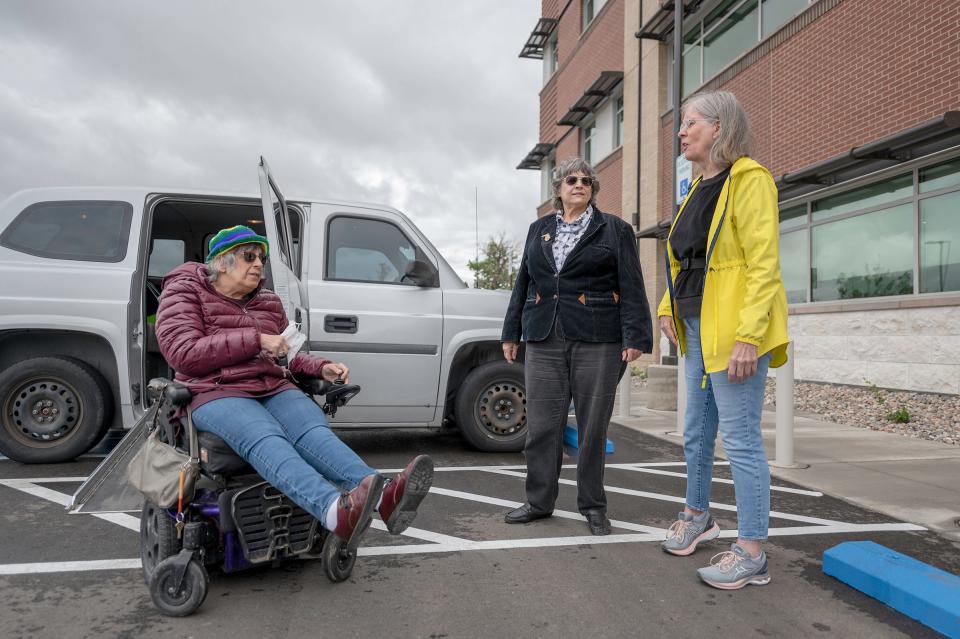Breaking down barriers: An advocate helps improve handicap access in Pueblo
Kristen Castor has seen accessibility issues from a lot of different angles.
The 68-year-old Pueblo woman has cerebral palsy and has made the transition from crutches to a manual wheelchair to a motorized wheelchair in her lifetime. She has also spent nearly two decades working behind the scenes to help remove barriers that make life more difficult for the disabled.
She is a non-attorney advocate for the Colorado Cross Disability Coalition and a founding member of the Pueblo Americans with Disabilities Act Committee.
The local committee was formed in 2003 after the U.S. Department of Justice audited Pueblo buildings and found more than 94 counts of non-compliance with the Americans with Disabilities Act — a civil rights law that prohibits discrimination against individuals with disabilities in all places that are open to the public.
At the start of the committee's work, the group realized a lot of buildings that needed to be made accessible were going to be replaced. The former 1949 police station was an example of a “terrible” public building, Castor said, that thankfully was replaced in 2010.
“It used to be there were days I did not want to go outside,” she said, because she was affected by other people’s attitudes, which ranged from referring to her as a ‘poor thing’ or telling her she couldn’t do something.
"I am used to just saying, ‘I’ll show you,’ when someone says they don’t know how I am going to do this. Believe me, I know what I can do and it's absolutely important to me to get where I want to go,” she said.
From her high school days, to college and graduate school, she has been a trailblazer. After graduation and a part-time gig teaching English as a second language to adults, she has found a way to stay employed working for disability rights.
Her goal has been to "represent in a positive light," she said.
New health center a shining example of modern handicap accessibility
The most stellar example of handicap accessible construction in Pueblo is the Pueblo Community Health Center’s new East Side Clinic, she said.
“When I drove up to the new east side clinic I thought to myself, ‘We have arrived.’ You can glide right into that building, it has automatic opening doors and there are no barriers,” she said.
“Even the examination tables move up and down for transfer from a wheelchair. That’s amazing,” Castor said.
The Pueblo Community Health Center, "takes pride in removing barriers for anyone who needs access to quality primary care," said Donald Moore, chief executive officer. "At the front end of our East Side Clinic design process, I wanted to hear the voice of the disability community and have them experience the fewest barriers in our facility.
"It is with much pride that I can say that we succeeded," Moore said.
"I am grateful Kristen Castor and the Americans with Disabilities Act coalition for their advice.”
More health news: State-of-the-art health center inaugurated in Pueblo's underserved East Side
Castor said she doesn’t think most people realize the changes that have been made over the years to accommodate people of all disabilities. For example, entrance doors are not supposed to require more than 4 pounds of pressure to open and ramps with little cast iron dots at the end of them are designed to alert those using a cane that they are coming up on a street.
Pueblo's committee has six members, most of whom have been serving since the beginning. The bylaws allow for 15.
“We could use some younger people out there running into barriers that need to be taken down. Now is the time to pass the torch,” Castor said.
All disabilities are represented to make a difference
There should be members who are deaf, visually impaired, or rely on crutches, walkers or wheelchairs to stay mobile, Castor said.
“When a bunch of different disabilities are represented that really makes a difference. We can do our best to come up with ideas to try to see what works, but sometimes, one person’s need goes contrary to the other,” she explained.
The committee can address issues such as service dog use or handicap parking but mostly it focuses on touring new construction or checking on sidewalk curb ramps where streets are paved.
“I don’t think there will be a curb ramp on every corner in the city, but the city has been pretty good” at addressing those with the highest priority, she said.
Committee meetings run from 1 to 3 p.m. on the first Thursday of every month at the Center Toward Self Reliance, 901 W. Eighth St. There is also a Zoom option.
For those on the committee, “There’s no magic to it, just passion,” Castor said. “It is truly rewarding to make Pueblo a better place to live.”
Those interested in joining the committee can visit the city website at pueblo.us, click on “our community,” then “get involved” and select “boards and commissions” to download an application. Completed applications can be submitted to the mayor’s office, 1 City Hall Place.

More access news: Pueblo woman awarded $20,000 in discrimination lawsuit against medical practice
Chieftain reporter Tracy Harmon covers business news. She can be reached by email at tharmon@chieftain.com or via Twitter at twitter.com/tracywumps.
This article originally appeared on The Pueblo Chieftain: Handicap access advocate helps break down barriers in Pueblo

